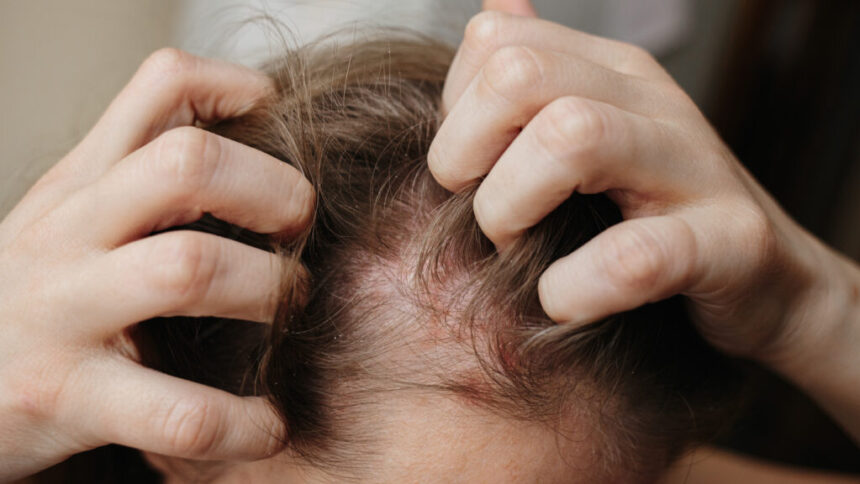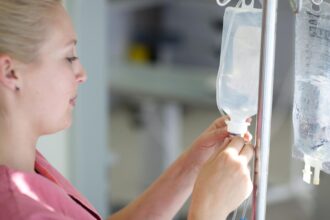That itchy feeling isn’t just in your head, in some cases it might actually be all over you. And it may literally get on your nerves. New research published Wednesday in Cell indicates that a common skin bacterium — Staphylococcus aureus — can make you feel itchy by directly acting on nerve cells.
Even though itchiness is an everyday sensation, its causes remain mysterious. “So we’ve revealed that one of the ways that this sensation happens is through a bacteria on our skin,” said Isaac Chiu, associate professor of immunology at Harvard Medical School and primary investigator on the paper. “And so maybe this is one way that we could target the itch in that disease.” This finding, he added, could one day inform the design of pills and skin creams that target bacteria, or its receptor on nerve cells, to stop the itch-scratch cycle.
About a third of people carry S. aureus in their nose, and its presence on skin is associated with chronic diseases that cause itchiness, like eczema (also known as atopic dermatitis), psoriasis, and prurigo nodularis.
“So, it is not the nicest bug to have on you for sure,” said Liwen Deng, the paper’s first author and a postdoctoral research fellow in Chiu’s lab.
The researchers were interested in learning how neurons, immune cells, and microbes communicate with each other. When they injected MRSA, a type of S. aureus, under the skin of mice, as expected, they itched so much that it damaged their skin. But there was no inflammation. This means that inflammation is not required for itch to occur, Chiu told STAT. In other words, the nerve that detects itch sensed the bacteria even if there was no immune response.
Further research showed that when S. aureus invades the skin, it releases 10 different enzymes, or proteases. One of them, called V8, latches on to a protein on nerve cells called proteinase-activated receptor 1, or PAR1. The scientists said they believe this starts a chain reaction from the skin neurons, to the spinal cord, and to the brain, which then triggers the urge to itch.
“We could block itch, by blocking this pathway,” Chiu said.
Until now, researchers thought the link between bacteria and itch was indirect. “We thought it was A to B to C, and then we found out there’s actually an A-to-C direct route this whole time,” said Brian Kim, a physician-scientist at Icahn School of Medicine at Mount Sinai, who was not involved with the research. He said this is one of the first papers that shows a clear mechanism between bacterium and the need to scratch.
‘It kind of makes you wonder now, ‘Oh, boy, like, what else did we miss?’” Kim said.
In mice, the itching only stopped when researchers used Vorapaxar, a drug approved by the Food and Drug Administration that prevents blood clots, but also can block the PAR1 receptor.
“That just seemed to be a good way to test the therapeutic potential of using this drug to treat itch, which has not been tested before for this drug,” said Deng.
Chiu cautioned that the study was done in mice and the findings might not correlate with what happens in humans.
“We’re adding bacteria to the mice and putting a gauze on top of it so that it stays there. So potentially, in the future, we would want to look at this in maybe more models of atopic dermatitis in animals or more naturalistic models in human skin,” Chiu said.
Robert LaMotte, a professor emeritus at Yale University School of Medicine, who was also not involved in the study, said it would be important to test whether V8 evokes itch in people, and if so, what type of receptors they activate.
While the researchers who spoke with STAT believe the new study provides strong evidence to show a direct link between bacteria and itchiness, Chiu said that he and his colleagues could not rule out all of the immune pathways, even though they did rule out communication between many immune cell types, including mast cells, basophils, and T cells.
“There could still be some intermediate step that V8 is acting on some other cell types,” Chiu said.
Deng believes there are more bacterial pathways that are waiting to be discovered. “It really opens up this whole area of trying to see what other microbes, microbial products, contribute to itch,” Deng said.
A bigger question still remains: Why do we feel itchy and scratch? The researchers speculated that the phenomenon could be comparable to other reflexes, like coughing or sneezing, that enable the spread of microbes.
“There’s still a lot left to learn, you know, the field is just in its infancy,” Kim said. “Once you see this paper, you’ll never think about bacteria on your skin the same way again. … You might go, ‘Gosh, is this thing actually getting on my nerves?”’









